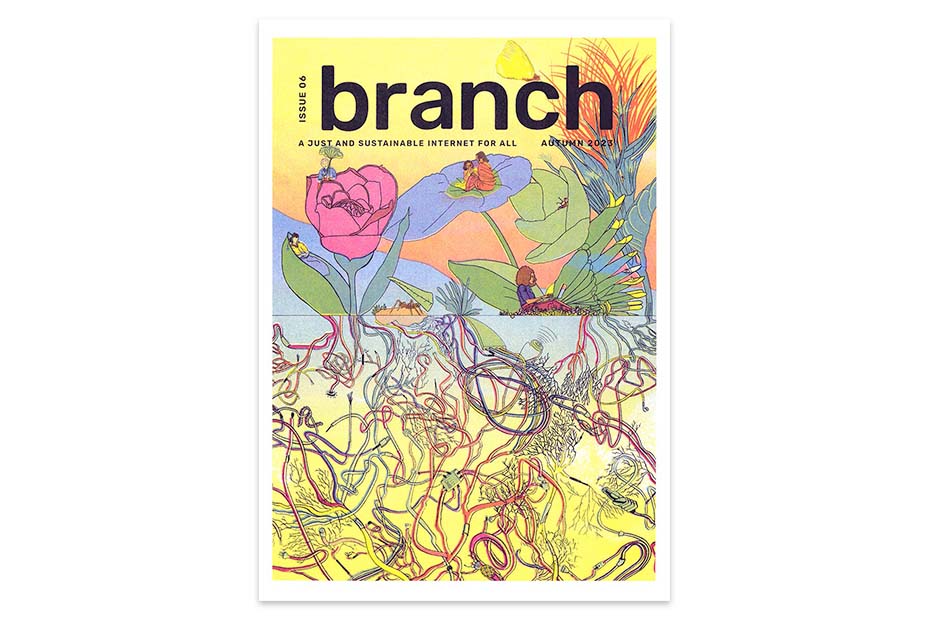A burgeoning community of grassroot and Indigenous organizers, digital rights and environmental NGOs, and philanthropic donors are on multiple, and at times converging journeys to explore how digital rights and climate justice intersect.
In collaboration with Green Web Foundation and Green Screen Coalition, we are proud to present ‘Branch Magazine: Issue #6 Green Screen’. This issue aims to amplify voices from feminist, decolonial and Indigenous perspectives, and which center care, respect, and non-extractive forms of exchange.

Issue overview
In this multilingual edition, edited by Katrin Fritsch, Maya Richman, Fieke Jansen and Katherine Waters, you will find different perspectives that critique technocapitalism, and envision pathways for a just transition to sustainable and equitable infrastructures. It consists of four sections, each with a number of essays, interviews, and reflections.
Countering false and misleading solutions to ecological crisis
Becky Kazansky and Nikita Kekana [EN] reflect on and challenge the reduction of natural elements to financial commodities. In the interview about her book ‘Tecnologías para un planeta en llamas’ Paz Peña [ES] names and critiques technocapitalism and offers equitable feminist technological approaches as a way forward. We end this section with Jessica Botelho, Lori Regattieri, and Eliana Quiroz [EN] on empowering community-driven alliances against social-environmental and climate disinformation.
Towards a just and equitable transition
Heather Milton-Lightening [EN] speaks to the tensions and contestation between colonialism, capitalism, and justice, and discusses ways of organizing through which we can create the world that we want to see. A conversation between Joana Varon and Alana Manchineri [EN|PT] brings to light Indigenous struggle in the Amazon, the physical and technical colonial relations enforced on them, and ways of organizing. The Kuirme Collective [EN], consisting of Aymara Llanque, Camila Nobrega, and Rub(én) Solís Mecalco, invert the dominant discourse on extraction and identify ways to build alliances across movements and issues. Michael Brennan and Hanan Elmasu [EN] end with a reflection on navigating the interstices as funders.
Imagining sustainable and equitable infrastructures
Paola Mosso and Janna Frenzel [EN] reflect on their workshop discussion envisioning digital infrastructures and share time capsules from the future. They emphasize that digital infrastructures are not just machines or processes, but the people who design, maintain and inhabit them. Juliana Guerra [ES] narrows in on who governs our internet infrastructures, who gets to decide how sustainability is defined, and who benefits from it. Jennifer Kamau [EN] shows us that as long as migrants from climate-vulnerable countries are trapped in racialized infrastructures and do not have an equal seat at the table, there can be neither equity nor sustainability. Remy Hellstern and Jen Liu [EN] argue that we need to learn from nature and create proactive response frameworks and technologies that are regenerative by design.
Building bridges and ensuring tech serves equitable climate action
The video message ‘An open movement to support climate action’ [EN] reinforces that open is a tool to shift power, that the open community is working to be in service of climate justice and equitable climate action. Luis Carrasco [ES] argues for the power of open data, but only if we can unlock its knowledge to the public. Maya Richman and Fieke Jansen [EN] reflect on their work to bring the climate justice and digital rights communities together and Nathaly Espitia [ES] offers an example of community organizing that centers self-care and collective care through ‘Postales sonoras’ or ‘Sound postcards’. Oona Castro [PT] investigates the need for just socio-environmental infrastructures in the Amazonian Region. We close this special edition with an interview with Molly Mathews [EN] on organizing behind the scenes.
Please read the contributions with care and appreciation for all those who are exploring this emerging intersection. Special thanks to Maya Adams and Kira Simon-Kennedy for the beautiful visuals and photographs that accompany the pieces; and to La Bruja RISO for the cover design.
Green Screen Catalyst fund
The Green Screen Climate Justice and Digital Rights Coalition is a group of funders and practitioners looking to build bridges across the digital rights and climate justice movements. They have been the driving force behind this edition of Branch. They recently launched their new Green Screen Catalyst fund, which is open for concept notes until Nov 15th 2023. The Fund has been built to catalyze the ideas of individuals, organizations, and networks on the specific issues around climate justice and digital rights. Grants of between $10k and $40k are on offer. For info check out their website.
More about Branch
Branch has been in publication since 2020 and each issue is jam packed with personal reflection, critical engagement with technology and internet economics, as well as experimentation and storytelling. Creating change requires all kinds of practices—art and design, professional development, civic participation, policy and advocacy, imagination and positive visions for our future. Branch is our small attempt at sharing what inspires and challenges us towards a sustainable and just internet for all.
Branch is designed to be ‘Demand Responsive’ to adapt to and reflect the physical infrastructure of the internet and the energy behind it. Utilising data from a grid intensity API, Branch has different interface designs that are shown dependent on the current energy demand and fossil fuels on the grid.